#no arranged marriages and no true aristocracy and waterbenders being fighters and so on
Text
Sokka's sexism
Sokka’s sexism from the earliest episodes is an interesting case, because the Southern Water Tribe, at least from what was presented to us on screen, doesn’t seem to operate that much on gender roles? Especially when compared to the Northern Water Tribe?
I mean, yeah, warriors (men) went to war, while women, children and the elders stayed at home. But as Hama’s story shows, when Fire Nation attacked Southern Water Tribe, both female and male benders were fighting against invaders arm to arm and it seems like they were the actual first line of defense there, not the non-bender warriors.
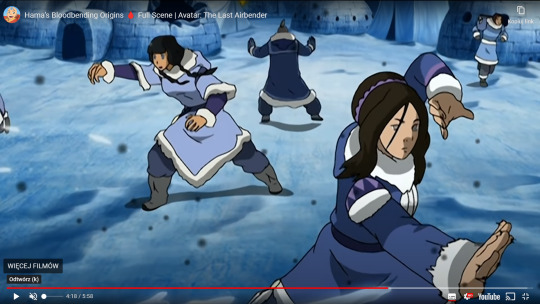
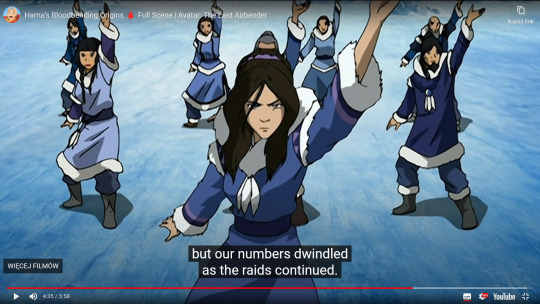
In contrast, during siege of North Pole, in the final of Book 1: Water, we don’t see any female bender helping defend their home except Katara, who was involved in protecting Aang when he was in Spirit World.
Since all the waterbenders were captured from the Southern Tribe, it makes sense that non-bender warriors stepped in and got involved with war, while the kids and elders were left under women’s care.
Another example comes from “a ceremonial test of wisdom, bravery and trust”, known as ice dodging. As Bato explained, it is a rite of passage for young Water Tribe members and in their village “done by weaving a boat through a field of icebergs.” When a child turns 14, their father was supposed to take them to ice dodging, so they could earn their mark. Though the episode itself was focused on Sokka’s ceremony, Bato never specified it as something that boys alone should do and not only Katara (girl) but also Aang (outsider) is allowed to take part in the ritual. Once Sokka proved himself, everyone of their group got a mark, as a sign they passed the test. Interesting thing to note, since Bato did not specify it is a rite of passage for boys alone, it suggests girls were expected to know how to sail in boats of the Southern Water Tribe. Of course, again, war didn’t allow to continue this tradition as men (Hakoda, in case of Sokka & Katara) left to fight against Fire Nation.
Later, when Sokka and Katara reunited with their father, Hakoda did not try to send away Katara nor relegate her to just a medic job during the invasion. In Northern Water Tribe episodes, we learned that teaching for waterbenders there was defined by gender - women were allowed to learn only how to heal, while men how to use their bending in fight. Hakoda, nor Bato nor other of their warriors even for a moment questioned Katara’s presence on the battlefield nor the presence of women in the ranks of their allies like a blind, 12 years old Toph or the female water benders from Swamps or female(?) soldier from Earth Kingdom
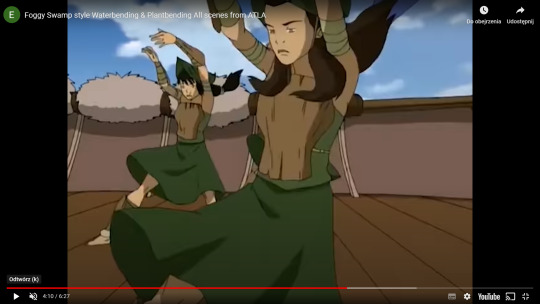
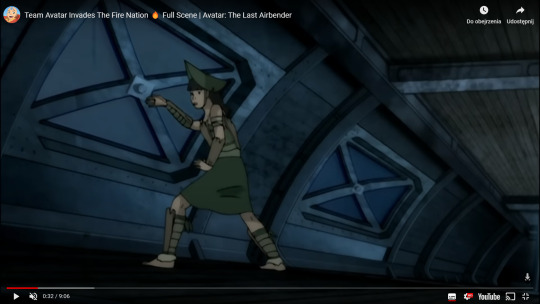
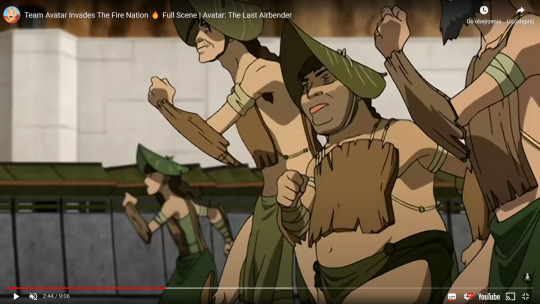

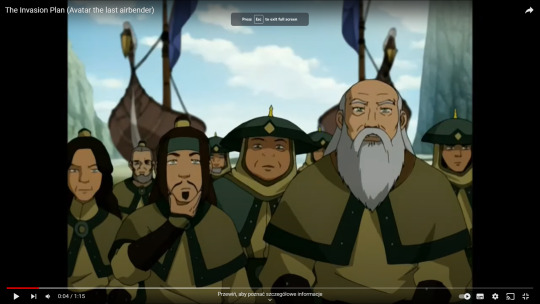
And during battle, Katara did not fight in rank with other soldiers, she first alone secured Appa during submarine attack, then alongside her brother and father took down guardhouses - Hakoda himself told her and Sokka to attack one when he took down the other one
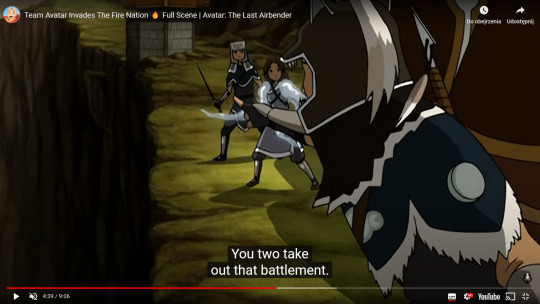
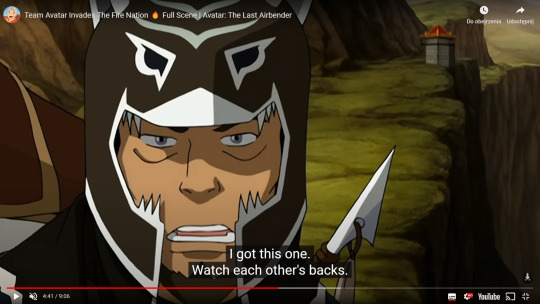
showing how much he trusted his 15 years old son and 14 years old daughter while ordering them attack on Fire Nation adult soldiers hidden in well guarder place.
Later, when Hakoda got seriously injured and Sokka temporary took the command of their forces, we could see that Hakoda relied on Katara to follow his troops and not ever once tried to send her back “to safety” or argued she should leave him behind, as often it happens with heroic (male) figures. Quite the opposite. When Katara offered him to “wait here if you want”, Hakoda firmly said “I want to press forward with the others”, which meant his daughter needed to come with him directly into an already ongoing fight (even if they stayed more at the rear of their army, they were still on battlefield).
She and her brother, alongside with the youngest members of Invasion, were forced to flee on Appa once the battle was lost, but no other adult woman was included. During Zuko’s coronation, when all war prisoners were released, in the background we could again see the female character(s) from Swamps.

And let's not forget how impressive Hakoda was by Suki when she single-handedly captured the warden at Boiling Rock prison and did not try to stop her from fighting against Ty Lee alongside Zuko and Sokka against Azula.
Understandably, we have no idea how the Southern Water Tribe and its culture looked like before the war, even arguably, the characters themselves may not have a clear idea due to growing up in dire times. But my point is, Hakoda and Bato, the two main adult Southern Water Tribe’s warriors that Avatar: The Last Airbender allowed us to know more about, have never shown any direct sexism toward Katara or other female characters. And though Sokka was the oldest boy at their village, there is no reason to think women did not hunt in absence of men, because one person would not be able to provide for a whole community 24/7. Also, as Hama proved, the Southern Water Tribe’s waterbenders were capable of fighting and their gender did not play any vital role the way it happened in their sister tribe at North Pole.
Of course, Fire Nation’s repeated attacks affected residents of South Pole and their living conditions but from the little bits the show gave us, I think it is correct to assume if Sokka grew up with Hakoda around to guide him as he should, his behavior would be different from the sexism and dismissive attitude toward Katara or Kyoshi Warriors. For one, logically thinking Southern Water Tribe’s warriors need to do all the cooking, sewing and keeping their camp clean all on their own during war so it is not a “girly job” but a vital part of a warriors skills to survive and ensure their equipment is in the best condition. But Sokka doesn’t know it, because there is no one to teach him the importance of those skills. All Sokka had was father’s farewell words to cling to - and I’m not sure if Hakoda truly expected his son to be able to protect Katara and the village in his absence, or he just tried to make Sokka feel a bit less depressed about being left behind. You know, by giving him purpose and a Big Important Job to focus on and to feel needed and trusted.
Which leads me to think that Sokka’s sexism is not rooted in Southern Water Tribe’s culture itself, but in his own insecurity and pressure of being the oldest boy in the village. If girls could be warriors - and be better than him - it would put into question all his self-worth, purpose and the trust given by father. Once Sokka met Kyoshi Warriors and later all the skilled girls, it challenged him on a very personal level, but he accepted the truth and moved on and alongside, finally became a true warrior and a man.
And I find it indeed an interesting case, as Sokka’s sexism and dismissal of girls is not necessarily stemming from the culture he is part of, but rather is the effect of not knowing said culture & pre-war history of his Tribe. And of course, from his own insecurity.
#atla#avatar: the last airbender#sokka#hakoda#just some thoughts#because bato and hakoda seems pretty okay toward katara and include her in rite of passage for sokka and invasion battle#like her age and gender doesn't matter#with dad and dad's friend (bato) like that where comes sokka's dismissal?#so i guess this is about sokka's insecurity and growing up without father to guide him#good suki straighten sokka up pretty quickly#i'm pretty sure SWT has some sense of gender roles but not so strict take like northern water tribe#no arranged marriages and no true aristocracy and waterbenders being fighters and so on#sokka though lives in destroyed by war tribe to understand yet what was done to his community i guess?
115 notes
·
View notes